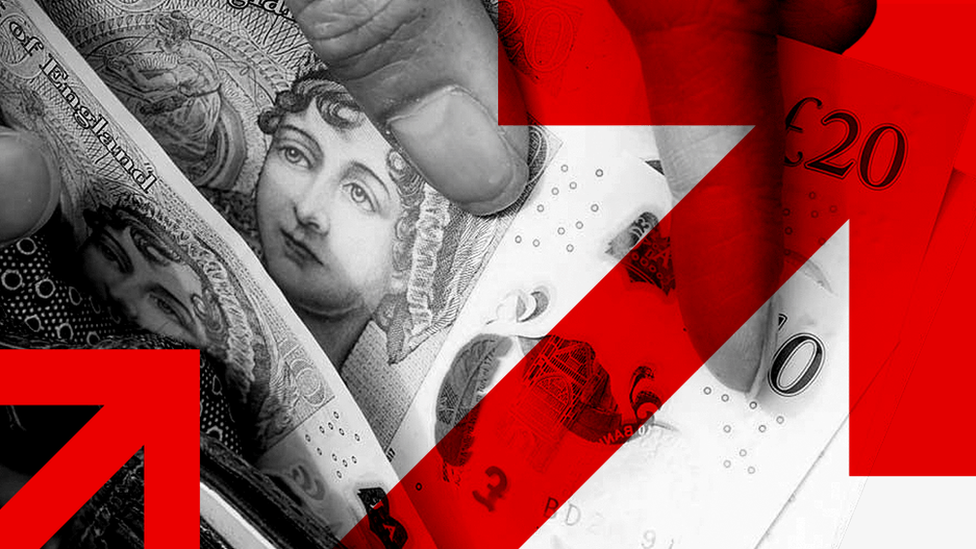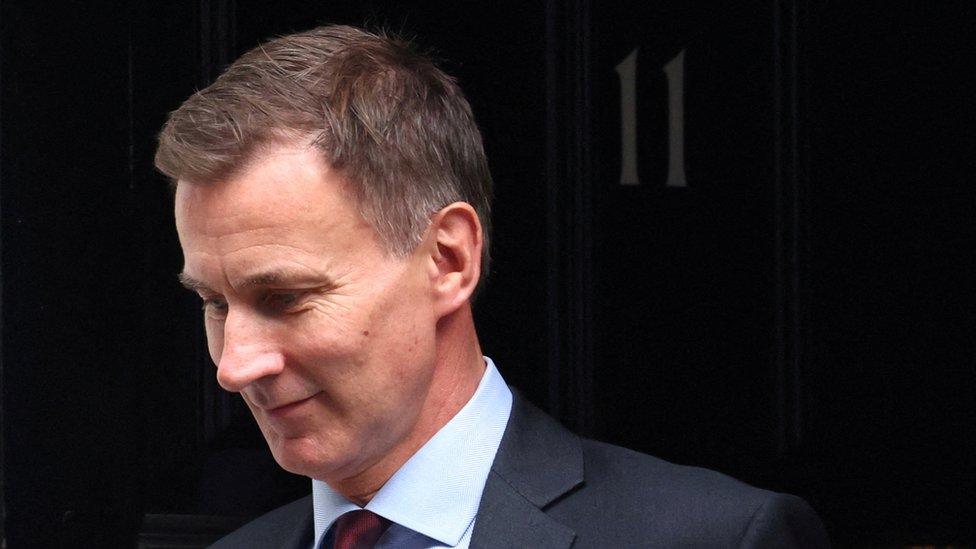Why the change of message on Autumn Statement tax cuts?
- Published
- comments

It looks like the Autumn Statement will now include at least one crowd-pleasing personal tax cut - so why the change of message and which tax could be cut?
When I spoke to Jeremy Hunt 10 days ago, just after it was confirmed that the UK economy was not growing, I suggested to him that personal tax cuts might help.
He said there were "no shortcuts" and clearly signalled that his focus was on growth-enhancing business tax cuts.
He'd previously declared personal tax cuts "virtually impossible".
A week on, I spoke to the chancellor again, at a hydrogen energy facility in Sheffield. The caution on such cuts had gone. And the prime minster has now suggested the time has come to cut tax.
For Rishi Sunak, last Wednesday's drop in inflation was a clear turning point in Britain's recent economic story.
During his time as chancellor and as prime minister - most of the past four years - the UK and most of the world have been hit by an unprecedented series of geopolitical crises that have led to big spending and rolling inflationary shocks.
The pandemic led to an inflationary supply chain crisis pushing prices up, and then the Russia-Ukraine conflict saw the double whammy of the world's biggest energy exporter invading one of the world's biggest food exporters.
At this precise time, the size of Britain's workforce was hit. In part, this was due to the aftermath of the pandemic, and in some key sectors, by more restrictive post-Brexit worker visas. It was a potent cocktail for inflation.
The government's argument therefore, is that last week's confirmation that inflation has more than halved since its peak is a turning point for inflation.
The UK is on a glidepath to normal inflation levels, and therefore, they argue, there is little risk of a personal tax cut adding to price pressures.
Focus on growth
But the PM's argument goes further. He says that the 4.6% inflation figure also represents a turning point of a rolling series of economic crises since 2020. The time to put four years of higher public spending, borrowing, and taxation behind us.
He is taking aim at Labour's calls for a "new" post-pandemic world of more resilient local supply chains, and more borrowing-funded public spending especially on green infrastructure.
US President Joe Biden may be able to do this because the US has the privilege of printing the world's reserve currency, and is insulated from fears about its debts. The UK, especially after last year's mini budget, cannot do this, Mr Sunak argued.
This will be the dividing line of the next year with a Labour Party that aims to spend £28bn a year more on public investment by the end of the coming Parliament.
So the tax cuts will be part of a general message that, having seen inflation halve, now the focus is on growth.
National Insurance could fit the bill
The overwhelming focus of the cuts will be aimed at helping businesses to invest. But, a tax cut that helps "make work pay" and so improves the supply of workers, helping relieve a key constraint on growth, will also be delivered.
National Insurance seems to fit the bill, because it directly helps employers or workers keep more from wage packets. Another option is ironing out some of the inconsistencies in the tax system that see some universal credit recipients, working parents and higher earners facing effective tax rates so high that it makes little sense to work more hours.
Former pensions minister Steve Webb has also spotted his old department seeming to prepare an unusual announcement on benefit uprating on an obscure part of the Department for Work and Pensions website.
When setting how much benefits go up next April, the government could decide to use October's lower inflation figure instead of the usual September figure. That could squeeze between £2bn and £3bn from the welfare bill every year.
Both the PM and chancellor make the argument that the level of benefits may exacerbate worker shortage problems.
Politics at play
In Westminster, others point out that the loss of the Supreme Court case on a plan to send some asylum seekers to Rwanda, on the same day as the inflation figure, may also help explain the search for a headline personal tax cut to assuage his backbenchers. The speech the PM gave on Monday, when he said the government was now able to cut taxes, was due to be given last Wednesday, before the Supreme Court's ruling.
So the contours of the argument this week will be the government arguing that an economic turnaround has created space for a tax cut, and the opposition will instead say the PM is jumping the gun at the behest of backbenchers and in any case only reversing one of two dozen tax rises.
In making a turnaround argument, it is worth waiting for what the independent Office for Budget Responsibility (OBR) says in its forecasts for the economy.
This month's Bank of England forecasts for quarterly growth next year are 0.01%, -0.04%, 0.01% and 0.02%. Over 2024, it adds up to zero.
The economy did avoid the recession predicted for this year, but how seriously can Downing Street proclaim a turnaround if the OBR predicts little or no growth over the next year?
It is also worth watching on what basis the government claims the PM's target on growth will be met.
So underneath a big call made on tax cuts at the Autumn Statement, there is a much wider, immediate political argument, and the outline of choice for the general election. But watch out for whether the OBR supports this "turnaround" picture.

What help would you like from the Autumn Statement? Do you have any questions you want answering? Get in touch by emailing haveyoursay@bbc.co.uk, external.
Please include a contact number if you are willing to speak to a BBC journalist. You can also get in touch in the following ways:
WhatsApp: +44 7756 165803
Tweet: @BBC_HaveYourSay, external
Please read our terms & conditions and privacy policy
If you are reading this page and can't see the form you will need to visit the mobile version of the BBC website to submit your question or comment or you can email us at HaveYourSay@bbc.co.uk, external. Please include your name, age and location with any submission.
Related topics
- Published22 November 2023

- Published17 November 2023

- Published20 November 2023

